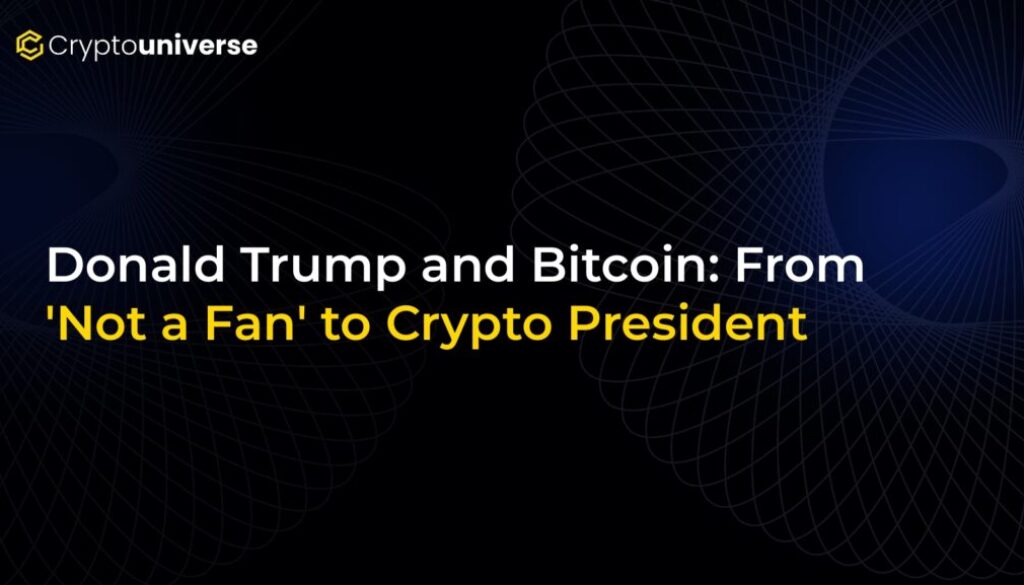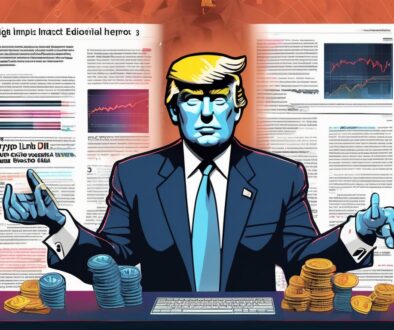Donald Trump and Bitcoin: From ‘Not a Fan’ to Crypto President

A Political Transformation: Trump’s Unlikely Journey into Crypto
In the high-stakes world of American politics, few transformations have been as stark or as surprising as Donald Trump’s evolution on cryptocurrency. Once a vocal critic who dismissed Bitcoin as a currency “based on thin air,” Trump has rebranded himself as the crypto industry’s champion, a self-proclaimed “Crypto President.” This dramatic pivot has not only reshaped his political platform but has also sent ripples through the digital asset space, capturing the attention of investors, developers, and voters alike. How did the former president go from a staunch crypto skeptic to its most powerful political ally? The journey involves NFTs, meme coins, and a strategic embrace of a technology he once scorned.
The Early Days: “I Am Not a Fan of Bitcoin”
To understand the magnitude of Trump’s shift, we must look back to his first term. In 2019, while in the White House, he made his position unequivocally clear in a now-famous tweet.
“I am not a fan of Bitcoin and other cryptocurrencies, which are not money, and whose value is highly volatile and based on thin air. Unregulated Crypto Assets can facilitate unlawful behavior, including drug trade and other illegal activity… We have only one real currency in the USA, and it is stronger than ever… It is called the United States Dollar!”
He doubled down on this sentiment in 2021, after leaving office. During a Bitcoin bull run, he told Fox Business, “Bitcoin, it just seems like a scam,” reasserting his belief that the dollar should remain the undisputed world currency. For the crypto community, the message was clear: a Trump administration was not a friendly environment for digital assets.
The Turning Point: A Foray into NFTs
The first crack in Trump’s anti-crypto facade appeared not through policy, but through digital collectibles. The shift began subtly in late 2021 when his wife, Melania Trump, launched her own NFT collection on the Solana blockchain. While Trump himself continued to call crypto “dangerous,” the seeds of change were planted.
The real catalyst came in 2022 when Trump launched his own series of digital trading card NFTs on Polygon, an Ethereum scaling network. Initially met with ridicule by some, the collection sold out almost instantly, generating millions of dollars. He has since released multiple collections, even minting some on the Bitcoin network using the Ordinals protocol.
Trump later credited the surprising success of these NFTs for his change of heart. He noted that a large number of buyers used cryptocurrency for their purchases, opening his eyes to the industry’s economic power. “I make money with it, I have fun with it too,” he told CNBC in early 2024. “Crazy new currencies, that’s what I call them.”
The Campaign Trail: Embracing the Crypto Vote
As the 2024 election cycle heated up, Trump’s casual interest morphed into a full-blown political strategy. His campaign began actively courting the crypto community, framing the election as a referendum on the future of digital finance in America.
From Mar-a-Lago to the Bitcoin Conference
In May 2024, at a Mar-a-Lago event for his NFT holders, Trump declared he was “good with” crypto and slammed the Biden administration for being “against it.” This moment energized his supporters in the tech world and led to a surge in donations from prominent crypto figures, including Gemini’s Winklevoss twins and Kraken’s Jesse Powell.
The embrace culminated in a landmark speech at the 2024 Bitcoin Conference in Nashville. There, he made his boldest promises yet, vowing to:
- Establish a “strategic Bitcoin stockpile” for the United States.
- Turn the U.S. into the “crypto capital of the planet.”
- Ensure the future of Bitcoin and crypto is made in America.
The Trump Crypto Ecosystem: Meme Coins and Family Ventures
Trump’s alignment with crypto has extended beyond rhetoric. A digital wallet linked to him by blockchain analytics firms holds millions in NFT royalties and various meme coins, including the unofficial Solana-based TRUMP token. The former president even hosted an exclusive dinner for the top holders of the TRUMP coin, further blurring the lines between his brand and the speculative crypto market.
His family has also dived headfirst into the industry. The Trumps have teased a DeFi project called World Liberty Financial, aimed at offering crypto borrowing and lending services. His sons, Donald Jr. and Eric, have also announced plans for American Bitcoin, a collaboration with mining firm Hut8 intended to become a major player in the Bitcoin mining sector.
A Pro-Crypto Administration in the Making?
Trump has signaled his intent to fill his administration with crypto-friendly figures. His pick for Vice President, Senator J.D. Vance, is a known Bitcoin holder. Other allies, like Robert F. Kennedy Jr. and Cantor Fitzgerald CEO Howard Lutnick, who have been floated for cabinet positions, are also vocal crypto supporters. Even Dogecoin enthusiast Elon Musk was reportedly tapped to lead a government efficiency commission, dubbed DOGE, though he has since stepped down.
Critics argue these ventures and associations represent a massive conflict of interest, potentially allowing the president to profit from policies he enacts. Supporters, however, view it as a pro-innovation stance that will prevent the U.S. from falling behind in a critical technological race.
Conclusion: A New Political Battleground
Donald Trump’s evolution from a crypto skeptic to its most vocal advocate is a testament to the industry’s growing political influence. His journey, fueled by the success of his NFTs and a desire to capture a passionate voter base, has fundamentally altered the conversation around digital assets in Washington. Whether his promises materialize or not, one thing is certain: Donald Trump and Bitcoin are now inextricably linked, and cryptocurrency has firmly established itself as a key issue on the American political stage.


